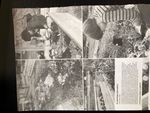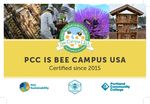Bee Campus USA - Portland Community College
←
→
Page content transcription
If your browser does not render page correctly, please read the page content below
Bee Campus USA - Portland Community College
Report on 2020
Pollinator Habitat Creation & Enhancement
One of the internal Eco Social Justice Grants received to support our pollinator effort was Trees for Bees, which, as its
name suggests, was buying trees that are great sources of food for bees and planting them on our campuses. We were able
to purchase 61 trees, most with 1 ½” caliper, and distributed them to the campuses to help satisfy the pollen and nectar
needs for our bees in the late part of the summer and into fall. Even though their canopies aren’t very large right now,
within the next ten years, these trees should be providing an additional 42,000 square feet of pollinator habitat! We also
had a class of Sustainable Landscape students install a 1,000 square foot Pollinator Habitat Garden outside the HIVE,
which consisted of tilling under grass and replacing it with clover, plus adding three pollinator trees that bloom in different
seasons, as well as some pollinator perennial plants in a bed directly under the entry to the hives. It was planted right
before the COVID shut down in mid March, so the students have only been able to see photos of how successful it has
become. There is also an area of 6,000 square feet in close proximity to the HIVE that we’ve tilled under the grass and
planted a mix of yellow mustard and phacelia as a cover crop, since these plants have been recently identified as highly
nutritious to bees. Another grant we received was for installing additional Pollinator Hedgerows. One of the locations we
started on is along the border of our orchard. Sustainable Landscape students added another 1,000 square feet of
hedgerow, using the same types of plants as the first part (completed in 2019) which was incredibly successful. Another
hedgerow area is a previously neglected, weedy site between the Learning Garden and the Washington County Master
Gardeners Education garden. This is being accomplished in partnership with the Master Gardeners, so their portion
(approximately 600 square feet) will be planted when we are allowed back on campus. The other 660 square feet has been
planted with pollinator trees, shrubs, and ground covers. Mulch will be added to most of the hedgerow to suppress weed
growth.Pollinator Hedgerow installation near Learning
Garden and Washington County Master Education Trees for Bees planting Phacelia cover crop attracting pollinators on campus
Garden
Education & Outreach
We were very fortunate to receive a few pollinator grants in 2020. One that is specifically for Education and Outreach was
our Honeybee Interactive/Visual Education (HIVE) project. We took a tiny home on campus and mounted educational
photos with descriptions on all the walls. If you follow the walls in a clockwise direction, you get a nice introductory
education on honey bees and pollination. We also installed two hives inside, which enter/exit through a window, equipped
with screened back panels, so that you can see/hear/smell the bees while in the HIVE. These hives are also equipped with a
Flow Hive on top so we can harvest honey from inside the HIVE. The project goals were to educate people of all ages with
limited pollinator knowledge to the importance of honey bees and the pollination work they do. It was also designed to be
used without the need of our beekeeper being present for the tour so tours can happen more often, without the
constraints of the beekeeper’s schedule. This project was finished in time to have the Grand Opening during Earth Week,
April 2020, which was cancelled. But we recorded a live video of the tour and shared it on our webpage and Instagraminstead.
Honeybee Interactive/Visual Education (HIVE)
Screen shot of live zoom tour of Rock Creek apiary,
project front entry near the Landscape Technology Side shot of HIVE showing beehives in window
pollinator gardens and HIVE project.
Department
Courses & Continuing Education
We have several classes, both for credit, as well as community education, that have pollinator education included. Most of
them are found when searching for Gardening, but some are with Biology or Landscape Design. Many, but not all, of these
courses have successfully switched to an online format. Our Cascade Campus, Learning Garden Coordinator, Jolie
Donohue taught vegetable gardening basics, small space vegetable gardening, culinary herb & edible flower gardening,
cool season vegetable crops, warm season vegetable crops, planting for a fall & winter vegetable garden, fall care of the
vegetable garden, crop rotation & companion planting, and troubleshooting the organic vegetable garden. Each class
included a component on pollinators and in particular, the troubleshooting and companion planting classes. All of these
classes successfully transitioned from in-person to virtual synchronous classes that were very well attended.Summer 2020 Community Education Classes offered Spring 2020 Community Education garden class-
Cascade campus pollinator party 2.2020
by Cascade Learning Garden Coordinator Learning Lab
Service-Learning
A total of 12 community-based learning (CBL) projects were created with credited Environmental Science and Research
classes (ESR). Jolie Donohue also created and facilitated a CBL project with ESR 172: Biological Perspectives II class. The
class was studying integrated pest management and she engaged them in a virtual CBL project on the impact of organic
pesticide use on bees. Jolie presented a virtual tour of the Cascade Learning Garden in the synchronous virtual classroom,
introduced pollinator decline, shared information on common organic pesticides and their impact on bees. The class then
split into small groups, selected one common vegetable garden pest, researched the recommended organic pesticide, it’s
impact on bees, and created an informational brochure on alternatives. This information will be included on our learning
garden website, social media, and garden signage.Biology students created pollinator signage for the Cascade Learning Garden in PCC and it's sustainability programs, like Bee Campus USA, help us maintain our
2020 ranking as one of the top Community colleges in the nation
Educational Signage
A Biology class on the Cascade campus in Spring 2020 had a section in their syllabus on interpretive pollinator/insect
signage.Two of the types of pollinator education signs we A sign of the times! Milkweed in bloom in one of our
Pollinator pesticide free zone signage
have on campus pollinator gardens on campus
Policies & Practices
We currently don’t use any neonicotinoid pesticides and only use herbicides when other methods are unsuccessful. There
are many pollinator habitat areas where no pesticides are used at all. These areas are managed with mowing, string
trimming, hand pulling and mulching. This year has been more challenging than most, with very limited personnel allowed
on campus, so the weeds have been more successful than in years past, but we are continuing to work diligently. We are
currently working on updating the IPM plan to include more pollinator specific wording.
Integrated Pest Management Plan:
Recommended Native Plant List:
Recommended Native Plant Supplier List:Staff hand pulling weeds in pollinator habitat
Learn More
https://www.pcc.edu/sustainability/on-campus/rock-creek/bees/
anne.lesenne@pcc.edu
https://www.instagram.com/pcclandscapetechnology/?hl=en
Table tent flyer designed to educate and encourage more participants in our Bee Campus USA committeeYou can also read



























































